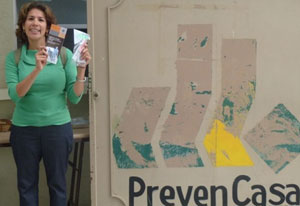Profile: Fogarty Scholar Dr Victoria Ojeda studies health on US-Mexico border
May / June 2014 | Volume 13, Issue 3

Photo courtesy of Dr. Victoria Ojeda
As a Fogarty Scholar Dr. Victoria Ojeda focused
on the health status and social incorporation of
Mexicans deported from the United States, in
particular male drug users.
On a daily basis, Dr. Victoria Ojeda commutes along the path that defines the lives of her research subjects. From her home in San Diego, it's a 20-minute drive to the Mexican border, followed by a brief walk to a medical clinic in the heart of the Tijuana Zona Norte, a section of town known for its cantinas, illicit drug use and prostitution.
As a Fogarty Global Health Scholar Ojeda was focused on the health status and social incorporation of Mexicans deported from the United States, in particular male drug users. Male deportees make up about 40 percent of the heroin, cocaine and methedrine injectors who come to the Health Frontiers Clinic in Tijuana, where Ojeda conducts her work. In general, research has shown that Mexican migrants use fewer drugs than other U.S. residents, but more than Mexican residents.
"My background is focused on immigrant health, so I am trying to understand what it was about this population that put them at such a high risk of drug abuse," says Ojeda, whose Fogarty fellowship was supported by the University of California, San Diego (UCSD), and Mexico's Universidad Autonoma de Baja California (UABC). "We also see a high rate of HIV infection among the drug injecting deportees. Disentangling that relationship is of great interest to me."
An estimated 10,000 injection drug users live in Tijuana, a city of 1.6 million. Their rates of HIV and other blood-transmitted diseases are high. Yet though the U.S. deported 725,000 Mexicans in 2011-2012 - more than 200,000 of them to the Tijuana area - there's little empirical research on this population, especially on what happens once they are "home."
"Some of these men and women have been deported five or 10 times. What role does that have on their families, on their communities?" asks Ojeda. "That has relevance not just to Mexico but to the U.S. as well. The ones who have TB or HIV or other sexually transmitted diseases, these transmissions are not contained by borders. These people come and go, and both countries can benefit if we improve health on both sides of the border."
Ojeda and her colleagues are also collecting data on family separation, including the economic impact of family members abandoned by deportees. "If you send a breadwinner out of the country, it has repercussions. Does it mean you are contributing to needs for public programs, food stamps, welfare that family members might be eligible for, if some are American citizens? What about families who now have to support a deported relative in Tijuana who has no Mexican documents? There's not much systematic research on the effect of deportation on the families left behind."
Most of the men are homeless. Police and other authorities victimize them in Mexico, she says. And some have lived in the U.S. for so long they no longer have good Spanish language skills. "I want to understand what it means for them to reincorporate back into Mexican society after being deported," says Ojeda. "What does it mean to reincorporate into an environment you didn't even want to come to?"
The National Institute on Drug Abuse (NIDA) also supports Ojeda with a career development award focused on the intersection of substance abuse, HIV and migration in female sex workers in Tijuana. The Health Frontiers clinic where she works is staffed largely by medical students from UCSD and Mexico's UABC.
Ojeda gives seminars on research methodology, migration and health issues to medical students working at the clinic. "It's a nice way for us to give the students an understanding of the value of research from the health and policy perspectives. It helps them understand the factors that led the patients they're seeing to the clinic." The medical students are trained in giving outreach talks on mental health, HIV prevention and other issues.
More Information
To view Adobe PDF files,
download current, free accessible plug-ins from Adobe's website.